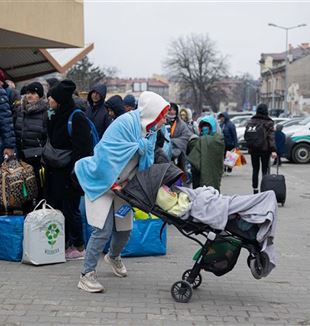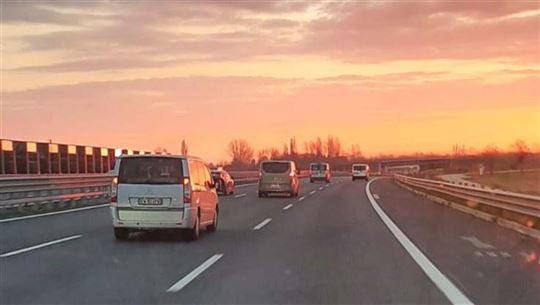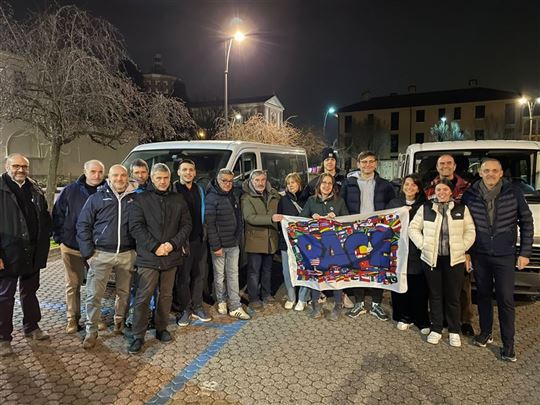
Przemyśl: "Our journey has just begun"
Friendship with a Ukrainian girl took them to the Polish border where refugees continuously arrive. The story of an unpredictable journey. "The human carries something inside that not even war can take away.”"Look, the images resemble those you see on TV, but on the news you do not breathe this air. And this air carries within it beastly human discomfort: the smell, the sweat, the tiredness, the need... It is devastating, you cannot describe something like it.” It is hard to be aware of, almost impossible if you have not been there. Przemyśl is the Polish village that has become famous throughout the world in recent days. It is a borderland; on one side are makeshift tents, volunteers who have come from across Europe and the station that we have seen in dozens of reports; on the other side is Ukraine, Putin's war and the trains that arrive packed with women and children, and lives full of despair. The bombs can now even be heard in Lviv, 97 kilometers to the east, but the wagons continue to unload refugees. Almost three million have fled so far. So many have passed right through Przemyśl to continue on to relatives, friends or anyone who can help, anywhere. And it is there, next to those tracks, that Giorgio and his friends have seen something that "has descended from the eyes to the heart,” wounds and questions that have stuck and still hurt, even now that they are back at home, after rescuing 29 mothers and children from the madness, and after an unpredictable 46 hour journey.
For Giorgio Orsi, an entrepreneur from Cernusco sul Naviglio, near Milan, his wife Angela and their two children, this story began years ago when Diana arrived from Ukraine, through the association Bambini dell'Est and Emmaus, a non-profit organization based in Kharkiv. She initially stayed for a few weeks, then as a foster child, and finally on a more permanent basis. When the war broke out, half of their heart was there, amid the bombs, with the children in the orphanages, whom Giorgio has seen several times and helps from afar, and with Diana's brothers who still live in Lyubotin, a suburb of the first city to be bombed. "We were in contact with Valja, her older sister who has a five-year-old daughter. After the first days of chaos, she called me, 'Giorgio, we are going to try to escape.' Valja, her daughter and three other siblings." A woman and four children walked to the village station and managed to catch a train headed first to Kharkiv and then to Lviv, toward the Polish border.
"It was Thursday night and I said to my wife: let's go get them," Giorgio says. He arranged a van to go to Poland. Francesco Calabria, an architect and business partner, cancelled his vacation weekend and offered to accompany him. Fr. Andrea offered the parish van. "While we are organizing, I got a phone call from Federica, the president of Bambini dell'Est: ‘I heard you are going to Poland. There are also four other people on the train to Lviv. Would you be able to take pick them up?"". Another van was needed, and a crew. And then another, and another, because within half a day the distress calls had multiplied, and the final list was 29 people.
"The first miracle was the willingness of those who offered themselves, in addition to the vans: we asked Rugby Cernusco, and both friends and people we'd never seen offered themselves. Lucia, my daughter, joined us with two of her university friends.” Within half a day, five vans were organized, each with three people on board. "When Enrico, one of the rugby players whom I didn't know and who is now a dear friend, said to me: ‘Sorry, are we going up empty-handed?’, the food and medicine collection began." The vans were soon filled with canned goods, powdered milk, diapers and bandages. And on Saturday, at 4 a.m., Fr. Andrea blessed the vehicles and the people leaving. The journey lasted 18 hours, and Giorgio spent almost all of them on the phone with Valja, who in the meantime was slowly advancing towards Lviv, as well as on the phone with the people of the movement in Poland to understand how to get there, with others in contact with Ukraine... names and the numbers of strangers, which gradually became a WhatsApp message, and finally a call from Mateusz: "How many of you are there? What do you need? Give me a couple of hours and I'll call you back."
The call came right on time, adding another element to this unpredictable and beautiful story. "They had heard from the mayor of Niwiska, a small village an hour from the border. He asked the local people who brought cots, blankets, towels... Even freshly washed toys and stuffed animals to a school. Fifty beds and hot meals, already ready for us and the children on their way." When they left the highway to follow the GPS to the meeting point indicated to them, Giorgio confesses that he was quite fearful: "Darkness, the Polish countryside, minus five degrees... People from the other vans they were messaging to ask me if we were in the right place.” It was there. In the parking lot of a hospital, a group of friends was waiting for them to unload the vans. From strangers, to names, to faces. It all happened on the drive. "We met Mateusz, and he introduced me to this big man who spoke a little Italian with an accent similar to that of St. John Paul II: ‘This is Piotr, my father.’ I looked at him: ‘Thank you! But why are you here?’ And he said: ‘We are from the movement, like you! We have Fr. Giussani's blood in us!’".
Francesco recounts that he was moved then, "I cried, I am not ashamed to say it. We knew that there were people suffering. Not that we were not prepared, we expected it. But we were not expecting people to help us like that. They made me enter into a different dimension. We were truly looked at as Jesus looks at us. We would all like to be looked at that way. Because God made us that way, like those who welcomed us. It wasn't a given that they would do that. Not just what they did, but how they did it."
Nothing about this story was taken for granted, from Mateusz, who offered to accompany them to Przemyśl and stay with them to help them, to what was happening at the station: "The train with Valja and the children was supposed to arrive before us. A friend of mine who works for Sky gave me the number of Monica Napoli, the news correspondent there. I messaged to her to ask for help. And she said: 'Don't worry, I'll get them back’.” When they got down there, they saw a Sky microphone raised in the air as a signal: "Giorgio, retrieve them. They are in the lobby, near the ATM. I have to go now."
That's where Giorgio and friends found Valja and Diana's brothers. In the station parking lot they organized themselves to wait for the other trains, because "they arrive, but you do not know when or from where. There is no communication." Giorgio, Mateusz and their friends shuttled back and forth all night long, as each train arrived at the station: "We went from the vans to the tracks with the photos they had sent us to track down those we were waiting for." All around was a tide of lost souls and hugs, of blank stares and people helping, women and mothers ("the true heroines of this war") knocking on the windows to ask for a ride – it didn’t matter where as long as it was away from the bombs. "We had to say so many 'no's.' But when we got the news that two people were coming a few days later, two seats became available. We were able to take a mother and daughter who were going to Naples." Francesco still has the faces in mind: "They were waiting for a hug. Like everyone there." At one point, Giorgio recounts that he found himself on the platform with a baby in his arms: “It must have been six months old. You look at the baby, and you realize you have something in your hands... You feel it is yours. It was strange, as if there were no difference with what I feel with my own children. You look at it the same way, even though five minutes earlier you didn't even know it existed. But it doesn't have to be yours to love it."
One by one, all 29 people arrived. The vans took them to the school where there was hot tea, a bed, silence, and questions that are still open. "What I saw has stayed with me," says Giorgio: "The pain takes your breath away. And I still have that air in my nostrils. But if I have to tell you that my heart has lost hope, it's not true. Because I think that the destiny of each one of us is unknown: it can also pass through war, and this stuff here. You don't understand it, you're faced with a cry of despair. But if you have come across a hypothesis of an answer in your life, you realize that one can be even the most destitute, the most beaten by events, the most needy, but they can carry something inside that not even war can take away. The cry is not in the dark, it is not the last word." At a certain point, before leaving for Italy, Alisa, five years old with blue eyes and a pink hat with a pom-pom, pulled something out of her backpack. "It was three sweets," says Francesco. "She gave one to me, the other to Lorenzo. She kept the third one." He is still moved thinking about it. He treasures that sweet. "And I didn't do anything - I just drove a truck. Can you believe that?"
Read also - My thirsty impotence
No, again, it is impossible to fully be aware of. Just as it is impossible to explain the abyss of freedom: "It's a drama," says Giorgio. "I had never perceived it this way: the person really is free, to the core. To the point of killing the other." Or to the point of spending time, energy, and life for that other. "That's what stays with me," Francesco adds, "As long as you help someone you know, somehow you explain it. But none of the people who took us in knew anyone. Yet something like this happened. We are these people. We have the same heart.... We needed the same air."
And the desire to live the same intensity, now that they're back home, with Diana playing in the living room with her brothers, the other children picked up, and their two last-minute guests arrived in Naples, "taken by rugby friends, who said 'we cannot leave them alone...'." Now that those 46 full hours are receding on the calendar, though another bus is arriving soon and more will likely come. "Of course, there's a load of feelings," says Giorgio: "You go there, on the edge of war, to save children. It is easy to feel close to them. But the interesting thing, for me, is what it generated between us. After all, I am used to saying ‘yes’ when there is a parachute available. But Our Lady had no parachute in front of the Mystery: she just said ‘yes’. I think that this time it was more like: ‘Oh, guys, we do not really know what is coming. But surely there is something great here, a promise'."
He wrote this in his last message on the chat with his fellow travelers, his wife, daughter, lifelong friends and strangers who have become brothers: "The body’s tiredness slowly goes away. So many questions and provocations remain in my head. I do not feel good about what we did together, but I am left with a wound that I am trying to understand. The fact that everything went well is not enough for our heart, it needs a greater certainty. Anyway, it is a story that did not end on Sunday night when we returned, but one that has just begun. For each of us and for each of them."